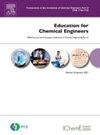Critical analysis of the educational objectives and graduate attributes of a chemical engineering program in the western of Mexico: Towards the integration of sustainable approaches based on regional problems
IF 2.3
2区 教育学
Q1 EDUCATION, SCIENTIFIC DISCIPLINES
引用次数: 0
Abstract
Adapting the Chemical Engineering curriculum to regional needs is crucial for addressing local challenges and fostering sustainable development. In this communication, we argue that tailoring educational programs and aiming early research to the specific industrial and environmental context of a region not only enhances the employability of graduates but also contributes to the economic and technological advancement of their communities. Using the western region of Mexico, particularly the state of Jalisco, as a case study, we explore the unique needs of the area. Jalisco is home to various industries, including tequila production, pharmaceuticals, and agriculture, each presenting distinct challenges such as wastewater management, by-product valorization, energy efficiency, management of financial projects, and quality management. We discuss how the educational objectives (EOs) and the graduate attributes (GAs) can be structured to address these local demands while aligning with global accreditation standards in Chemical Engineering education. By focusing on sustainability and the integration of regional problem-solving approaches, this study highlights the importance of curriculum adaptation to ensure the relevance of educational programs in a globalized yet locally diverse world.
对墨西哥西部化学工程项目的教育目标和毕业生属性的批判性分析:基于区域问题的可持续方法的整合
使化学工程课程适应区域需求对于解决当地挑战和促进可持续发展至关重要。在本文中,我们认为,针对一个地区特定的工业和环境背景定制教育计划和早期研究不仅可以提高毕业生的就业能力,还有助于其所在社区的经济和技术进步。以墨西哥西部地区,特别是哈利斯科州为例,探讨该地区的独特需求。哈利斯科州是各种行业的所在地,包括龙舌兰酒生产、制药和农业,每个行业都面临着不同的挑战,如废水管理、副产品增值、能源效率、金融项目管理和质量管理。我们讨论了如何构建教育目标(EOs)和毕业生属性(GAs),以满足这些当地需求,同时与化学工程教育的全球认证标准保持一致。通过关注可持续性和区域问题解决方法的整合,本研究强调了课程适应的重要性,以确保教育计划在全球化但地方多样化的世界中的相关性。
本文章由计算机程序翻译,如有差异,请以英文原文为准。
求助全文
约1分钟内获得全文
求助全文
来源期刊

Education for Chemical Engineers
Multiple-
CiteScore
8.80
自引率
17.90%
发文量
30
审稿时长
31 days
期刊介绍:
Education for Chemical Engineers was launched in 2006 with a remit to publisheducation research papers, resource reviews and teaching and learning notes. ECE is targeted at chemical engineering academics and educators, discussing the ongoingchanges and development in chemical engineering education. This international title publishes papers from around the world, creating a global network of chemical engineering academics. Papers demonstrating how educational research results can be applied to chemical engineering education are particularly welcome, as are the accounts of research work that brings new perspectives to established principles, highlighting unsolved problems or indicating direction for future research relevant to chemical engineering education. Core topic areas: -Assessment- Accreditation- Curriculum development and transformation- Design- Diversity- Distance education-- E-learning Entrepreneurship programs- Industry-academic linkages- Benchmarking- Lifelong learning- Multidisciplinary programs- Outreach from kindergarten to high school programs- Student recruitment and retention and transition programs- New technology- Problem-based learning- Social responsibility and professionalism- Teamwork- Web-based learning
 求助内容:
求助内容: 应助结果提醒方式:
应助结果提醒方式:


